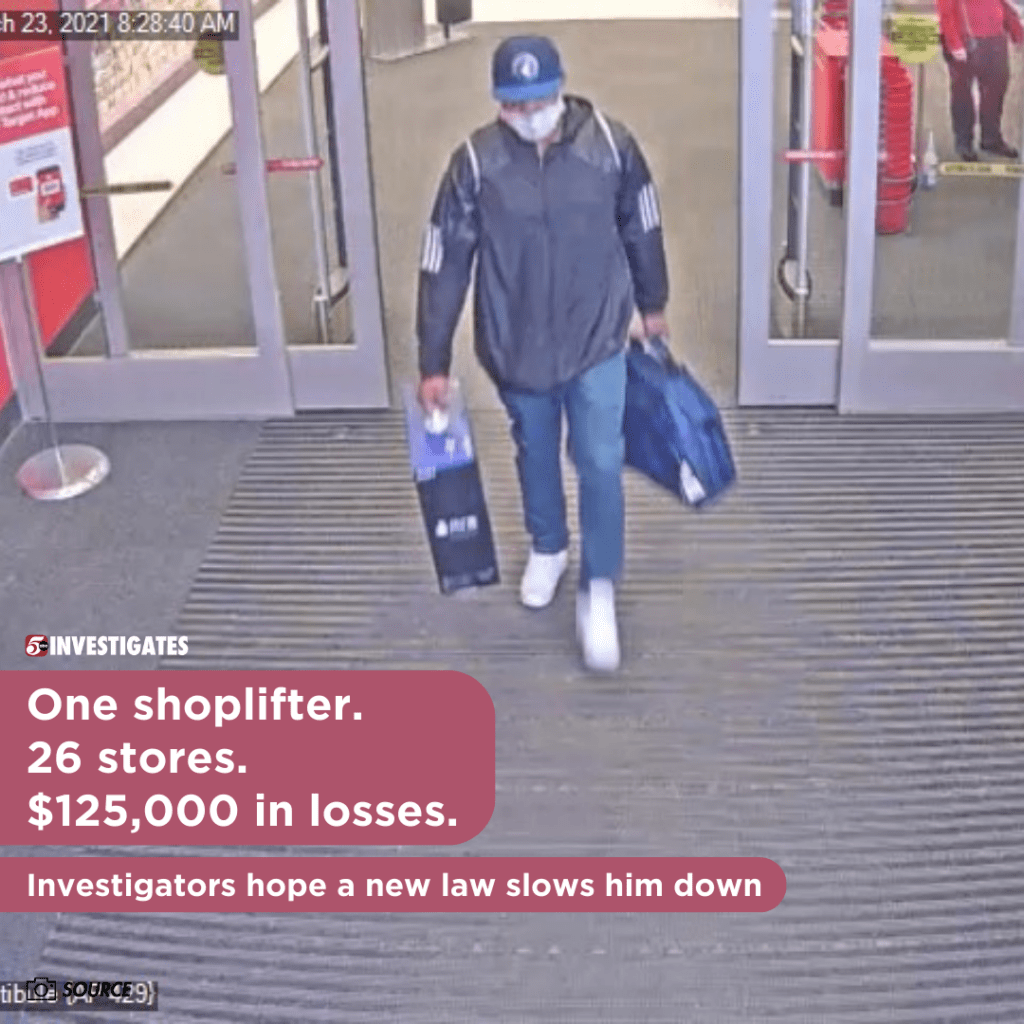Flash mobs took over Black Friday. But one shoplifter is a bigger problem for Minnesota retailers.
Employees could only watch as thieves sprinted out of the store with thousands of dollars of merchandise on the busiest shopping day of the year.
On Black Friday in 2021, so-called “flash mobs” targeted three Best Buy locations in Minnesota.
Video from those stores recently obtained by 5 INVESTIGATES shows how those highly organized “smash and grab” groups can quickly overwhelm even the largest retailers in the country.
Those retailers, including Minnesota-based Best Buy and Target, say “organized retail theft” is cutting into their bottom lines as they head into the holiday shopping season.
But while “flash mobs” motivated state lawmakers to add harsher criminal penalties this year, new national research shows most shoplifting can still be traced back to just one or two individuals.
5 INVESTIGATES reviewed theft reports from 30 Target and Best Buy locations across the metro over the past two years. Police and court records reveal one Minneapolis man alone, Angelo Wagner, Jr., is suspected of stealing more than $125,000 worth of merchandise.

“He figured out a specific way to do it,” Eagan Det. Dan Spiess said. “He goes in, steals a TV or the phones or the radios or whatever they are – and then a couple days later, he does it again.”
Still out there
Surveillance video obtained by 5 INVESTIGATES shows Wagner cutting iPhones away from a display in the West St. Paul Target.
At the Target in Lakeville, he sneaked into a locked stockroom and grabbed a Playstation 5.
In Oakdale, he and a co-conspirator walked out of Best Buy with several laptops.
Wagner hit at least 26 stores in Minnesota over just a two-month period in 2021, according to police reports.
Wagner, 34, was sentenced last year to 20 months in prison for multiple thefts. He was released this past spring, but court records show Wagner is again racking up theft and shoplifting charges all across the metro.
There are now warrants out for Wagner’s arrest after he failed to show up for several court hearings over the past two weeks.
Everyone pays
Wagner isn’t alone. A recent study published by the Council on Criminal Justice found more than 95% of shoplifting cases across the U.S. involve just one or two people.
“Eventually, it’ll impact us because Best Buy might have, let’s say, $50,000 in losses. Well, someone has to make up that amount somehow,” Spiess said.
In October, Minneapolis-based Target announced it was shuttering nine stores across the country, claiming theft was hurting revenue. So far, Target hasn’t closed any of its Minnesota stores because of theft.
Target didn’t respond to multiple requests for an interview with 5 INVESTIGATES. The corporation is hiring more security, using more training for employees, and working with government partners to develop “tools that prevent and detect criminal activity and integrating them into online and in-store processes,” according to a statement.
Boosting billions
Organized retail crime, which includes everything from exchanges at cash registers to planned cargo theft, cost businesses $112 billion, according to a recent study from the National Retail Federation. The average value of merchandise stolen by a “booster” before an arrest is $5,000, the study found.
“The people that are doing the stealing are different from the people that are monetizing and even different than the people that are laundering the proceeds,” said Landon Winkelvoss, a cybersecurity expert with Nisos.
Law enforcement successfully lobbied the Minnesota Legislature this year to create harsher penalties for organized retail crime, whether it’s people working in groups or individuals who have “engaged in a pattern of retail theft.”
It’s unclear whether the added consequences will apply to Wagner, since the law only went into effect on Aug. 1.
“That’s what I hang my hat on,” Spiess said. “Knowing that for my specific case, they might not have a lot of repercussions, or even go to jail or prison, but eventually down the road, if they continue down this path, they most likely will.”